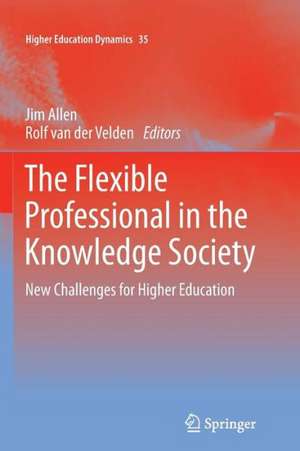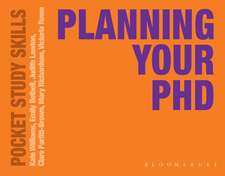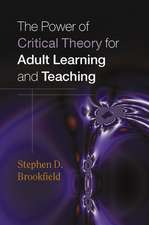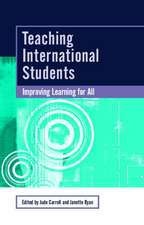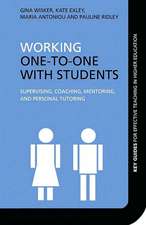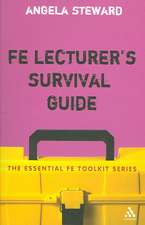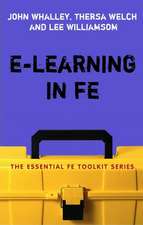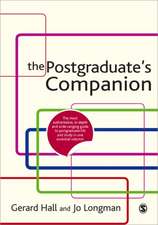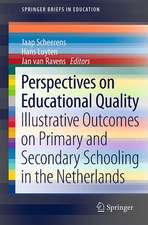The Flexible Professional in the Knowledge Society: New Challenges for Higher Education: Higher Education Dynamics, cartea 35
Editat de Jim Allen, Rolf van der Veldenen Limba Engleză Paperback – 3 aug 2013
| Toate formatele și edițiile | Preț | Express |
|---|---|---|
| Paperback (1) | 560.55 lei 38-44 zile | |
| SPRINGER NETHERLANDS – 3 aug 2013 | 560.55 lei 38-44 zile | |
| Hardback (1) | 646.62 lei 6-8 săpt. | |
| SPRINGER NETHERLANDS – 17 iun 2011 | 646.62 lei 6-8 săpt. |
Din seria Higher Education Dynamics
- 15%
 Preț: 648.24 lei
Preț: 648.24 lei - 15%
 Preț: 650.69 lei
Preț: 650.69 lei - 18%
 Preț: 957.62 lei
Preț: 957.62 lei - 18%
 Preț: 949.73 lei
Preț: 949.73 lei - 18%
 Preț: 897.65 lei
Preț: 897.65 lei - 15%
 Preț: 639.73 lei
Preț: 639.73 lei - 15%
 Preț: 648.56 lei
Preț: 648.56 lei - 15%
 Preț: 644.95 lei
Preț: 644.95 lei - 15%
 Preț: 641.85 lei
Preț: 641.85 lei - 15%
 Preț: 636.63 lei
Preț: 636.63 lei - 15%
 Preț: 644.18 lei
Preț: 644.18 lei - 18%
 Preț: 945.92 lei
Preț: 945.92 lei - 15%
 Preț: 640.55 lei
Preț: 640.55 lei - 15%
 Preț: 646.30 lei
Preț: 646.30 lei - 15%
 Preț: 644.63 lei
Preț: 644.63 lei - 15%
 Preț: 644.82 lei
Preț: 644.82 lei - 18%
 Preț: 946.24 lei
Preț: 946.24 lei - 15%
 Preț: 645.79 lei
Preț: 645.79 lei - 15%
 Preț: 645.79 lei
Preț: 645.79 lei - 15%
 Preț: 642.18 lei
Preț: 642.18 lei - 15%
 Preț: 645.79 lei
Preț: 645.79 lei - 15%
 Preț: 639.73 lei
Preț: 639.73 lei - 18%
 Preț: 952.26 lei
Preț: 952.26 lei - 18%
 Preț: 945.79 lei
Preț: 945.79 lei - 15%
 Preț: 643.65 lei
Preț: 643.65 lei - 15%
 Preț: 641.20 lei
Preț: 641.20 lei - 15%
 Preț: 638.11 lei
Preț: 638.11 lei - 15%
 Preț: 643.16 lei
Preț: 643.16 lei
Preț: 560.55 lei
Preț vechi: 700.70 lei
-20% Nou
Puncte Express: 841
Preț estimativ în valută:
107.27€ • 116.48$ • 90.11£
107.27€ • 116.48$ • 90.11£
Carte tipărită la comandă
Livrare economică 19-25 aprilie
Preluare comenzi: 021 569.72.76
Specificații
ISBN-13: 9789400736542
ISBN-10: 9400736541
Pagini: 296
Ilustrații: XXXVI, 260 p.
Dimensiuni: 155 x 235 x 16 mm
Greutate: 0.42 kg
Ediția:2011
Editura: SPRINGER NETHERLANDS
Colecția Springer
Seria Higher Education Dynamics
Locul publicării:Dordrecht, Netherlands
ISBN-10: 9400736541
Pagini: 296
Ilustrații: XXXVI, 260 p.
Dimensiuni: 155 x 235 x 16 mm
Greutate: 0.42 kg
Ediția:2011
Editura: SPRINGER NETHERLANDS
Colecția Springer
Seria Higher Education Dynamics
Locul publicării:Dordrecht, Netherlands
Public țintă
ResearchCuprins
Acknowledgements.- Editors.- Contributors.- Management summary.- 1. Introduction; Jim Allen and Rolf van der Velden_ 1.1 The policy context_ 1.2 The REFLEX project_ 1.3 Trends and demands_ 1.4 Methods and data_ 1.5 Structure of the report_ References_ Appendix 1.1 First and second level programmes per country.– 2. The Flexible Professional in the Knowledge Society; Rolf van der Velden and Jim Allen_ 2.1 Introduction_ 2.2 The demands from the world of work_ 2.3 On the role of higher education in preparing graduates for the labour market_ 2.4 The effects of programme characteristics on competences_ 2.5 Does higher education provide a good basis to enter the labour market?_ 2.6 Conclusions_References.- 3. The Professional Work of Graduates; Harald Schomburg_ 3.1 What makes a profession?_ 3.2 Who is working as a “professional”?_ 3.3 The role of professional knowledge_ 3.4 Professional role and professional identity_ 3.5 Professions and power_ 3.6 Discussion of results_ References_ Appendix 3.1 Mapping of 3-digit ISCO occupational codes to typology of professions.- 4. “Being Flexible”: Graduates Facing Changes in Their Work Environment; Julien Calmand, Michela Frontini and Michele Rostan_ 4.1 The changing work environment of European graduates_ 4.2 Outline of the chapter_ 4.3 Changes in graduates’ work and employment situation_ 4.4 Employment mobility in graduates’ early career_ 4.5 The impact of employment mobility on graduates’ competences_ 4.6 Employment mobility as a way to get a good job_ 4.7 Graduates facing temporary work_ 4.8 Functional flexibility in graduate employment and work_ 4.9 Functional flexibility, competences, and higher education_ 4.10 Conclusions: two different ways of being flexible_ References.- 5. The Graduates in the Knowledge and Innovation Society; Jean-Jacques Paul_ 5.1 Introduction_ 5.2 Some conceptual elements about innovation_ 5.3 What organisations are likely to be moreinnovative?_ 5.4 The place and the role of graduates regarding innovation_ 5.5 Are graduates equipped for innovation?_ 5.6 Innovation, occupations and rewards_ 5.7 Conclusions_References_Appendix 5.1 To what extent innovative activities are related to a specific working environment?.- 6. Mobilization of Human Resources; Jim Allen_ 6.1 Clarifying concepts_ 6.2 Mobilization of human resources during higher education_ 6.3 Higher education as producer of “mobilization” competences_ 6.4 Mobilization of human resources after higher education_ 6.5 Determinants of utilization of own capacities_ 6.6 Determinants of mobilization of others’ capacities_ 6.7 Conclusions_References.- 7. International Dimensions of Higher Education and Graduate Employment; Ulrich Teichler_ 7.1 The growing relevance of international dimensions_ 7.2 International mobility_ 7.3 The impact of international mobility on employment and work_ 7.4 Foreign language proficiency_ 7.5 Internationally mobile careers compared to home careers_ 7.6 Concluding observations_ References.- 8. Winners and Losers; Liv Anne Støren and Clara Åse Arnesen_ 8.1 Introduction_ 8.2 Labour market situation – match or mismatch_ 8.3 Wages_ 8.4 Work orientations_ 8.5 Job satisfaction_8.6 Summary and conclusions_ References_ Appendix 8.1 Definition of mismatch_ Appendix 8.2 The effect on wages of gender, grades, level of education, field of study, mismatch and type of job contract_ Appendix 8.3 Definition of winners and losers according to the graduates’ response to the questions on work values and job characteristics (realization of work values).- 9. Conclusions and policy implications; Rolf van der Velden and Jim Allen_ 9.1 General conclusions_ 9.2 Policy implications.- Index.
Textul de pe ultima copertă
This volume presents in detail the results, and policy implications, of a crucial project that aims to help shape the future for millions of Europeans. Higher education policy has increasingly gained a supranational dimension in Europe, with a federalist perspective boasting growing influence over national education policies. Given the vital links between the framework of higher education and the economy, this comes as no surprise in a Europe of coalescing financial interests. Against this background a large-scale research project was launched to assess the demands made by a modern ‘knowledge’ society on graduates of higher education. Called the REFLEX Project, it also aimed to establish the degree to which Europe’s higher education institutions are up to the task of equipping graduates with the skills to meet these demands. Rather than focus solely on tertiary education institutions, the REFLEX Project also sought to analyze how the requirements of the wider economy—as well as graduates’ ability to fulfil them—are in turn influenced by the way in which the process of work is organized in institutions of employment.
It was a huge project undertaken across 16 nations, featuring a survey of Europe-wide proportions—with some 70,000 graduate respondees. In addition to setting out the findings of the survey, whose content constitutes the largest data set of any comparable undertaking, this in-depth report uses these results to infer vital matters of policy that will need to be assimilated by those individuals and social institutions which help fashion tomorrow’s education paradigm—including graduates and prospective undergraduates. Whether consulted as a source of raw data or read as an influential intervention in the debate over education, this report deserves the widestpossible readership.
It was a huge project undertaken across 16 nations, featuring a survey of Europe-wide proportions—with some 70,000 graduate respondees. In addition to setting out the findings of the survey, whose content constitutes the largest data set of any comparable undertaking, this in-depth report uses these results to infer vital matters of policy that will need to be assimilated by those individuals and social institutions which help fashion tomorrow’s education paradigm—including graduates and prospective undergraduates. Whether consulted as a source of raw data or read as an influential intervention in the debate over education, this report deserves the widestpossible readership.
Caracteristici
More actual information on higher education and work than any other data set at present Indispensable for policy makers who want to learn how higher education should prepare for the knowledge society Helps graduates prepare for the world of tomorrow
